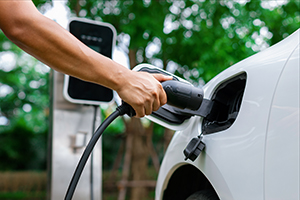
The electric vehicle (EV) revolution is here. Installing EV chargers at your business has become a necessity as your employees and customers will need a place to charge their EVs while they work or shop. Plus, offering EV charging stations in your parking lot can set you apart from your competitors. Learn how to choose the right EV charger for your business below.
Types of EV Chargers
Understanding the various types of EV chargers will help you decide which one is right for your business. Let’s explore them.
Level 1 Chargers
Level 1 chargers are the most basic option. They use a standard 120-volt outlet and are the slowest, taking about 20 hours to charge. This type of offering might suit businesses where patrons will park their vehicles for long durations, such as hotels or airports with overnight parking accommodations.
Level 2 Chargers
Level 2 chargers are more powerful, using a 240-volt outlet and reducing charging time to around four to eight hours. They are ideal for businesses wanting to provide a faster charge to customers, employees, or fleet vehicles. Think retail stores, office buildings, and parking structures.
DC Fast Chargers
DC Fast Chargers are the quickest, fully charging an EV in about 30 minutes to an hour. These chargers are perfect for businesses offering rapid charging, such as gas stations, restaurants, and highway rest stops. However, these chargers require significant upfront investment and infrastructure.
Location Matters
Consider your business location when choosing an EV charger. Are you in a high-traffic area, or do you have a more niche customer base? Urban areas might benefit from multiple Level 2 chargers, while rural locations might only need one.
Parking Space Analysis
Evaluate your parking space. A DC fast charger can serve multiple vehicles throughout the day if you have limited spots. Larger lots might benefit from several Level 2 chargers to accommodate more EVs over longer periods.
Understanding Your Customer Base
Know your customers’ needs. Are they quick-stop shoppers or employees there for an eight-hour workday? Align your EV charging options with your target audience’s behavior to maximize the benefits.
Cost Considerations
Installing an EV charger is an investment like many things in the business world. Explore a few considerations to help you choose the right EV charger for your business.
Initial Investment
Understand that installing EV chargers involves an initial investment. Level 1 chargers are the least expensive but are the most inconvenient. Level 2 chargers provide a good balance of cost and functionality. DC Fast Chargers are more costly but offer the fastest service.
Long-Term Savings
Despite the initial costs, EV chargers can save money over time. Reduced fuel costs, potential tax incentives, and increased customer traffic all contribute to long-term savings. Consider this investment an opportunity to turn your business into an EV destination.
Financial Incentives
Research local and federal incentives. Many areas offer rebates, grants, or tax breaks for installing EV chargers. These incentives can significantly offset the initial costs.
Choosing the right EV charger for your business is crucial for sustainability and improved customer service. Take the first step today and position your business at the forefront of the EV revolution.

